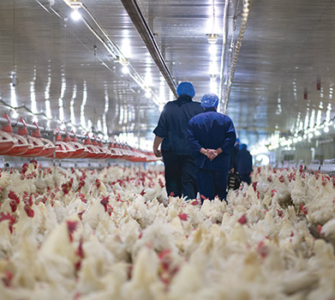Why infectious bronchitis is so resilient — and what broiler companies can do about it
Control of infectious bronchitis (IB) requires good biosecurity, good management and rigorous administration of a vaccine that matches the circulating virus as closely as possible, John Smith, DVM, MAM, Alectryon LLC, formerly with Fieldale Farms, told Poultry Health Today.
As IB viruses replicate, they mutate, and once in a great while that mutation gives the virus a competitive advantage. That can be a big problem, particularly if the mutation changes the virus’ surface coat and the virus is no longer recognized by vaccine antibodies, Smith said.
While the bronchitis virus doesn’t kill the chicken, it damages the defense mechanisms, and secondary bacterial invaders like Escherichia coli infect the chicken, resulting in mortality and condemnations, he said.
Certain regions of the US affected by IB have dense chicken populations, with many companies growing different sizes of birds and using different vaccination programs.
“When you’ve got that many chickens and you’re pouring live-virus vaccines into the chickens, which are replicating, numerically you increase the odds that periodically you’re going to get a new one, and it’s going to take hold and give you some trouble,” Smith emphasized.
A number of measures are needed to control IB, starting with strict biosecurity, which is easier said than done since the virus is everywhere and is highly infectious, he said.
Good management is critical to reduce bird stressors and improve poultry-house air quality, particularly in the winter. Careful monitoring is needed to spot the onset of an emerging clinical problem as early as possible, Smith said.
Once there’s evidence of an emerging problem, producers need to find the virus and get it clearly identified, which is fairly easy with the sequencing techniques available, he said.
Matching the vaccine serotype as closely as possible to the challenge is important because there’s no cross-protection between IB vaccine strains. “Close matching is very important, particularly if you want to get sterilizing immunity that stops the spread and the shed, which would be the optimum outcome,” he said.
Posted on February 16, 2018

















